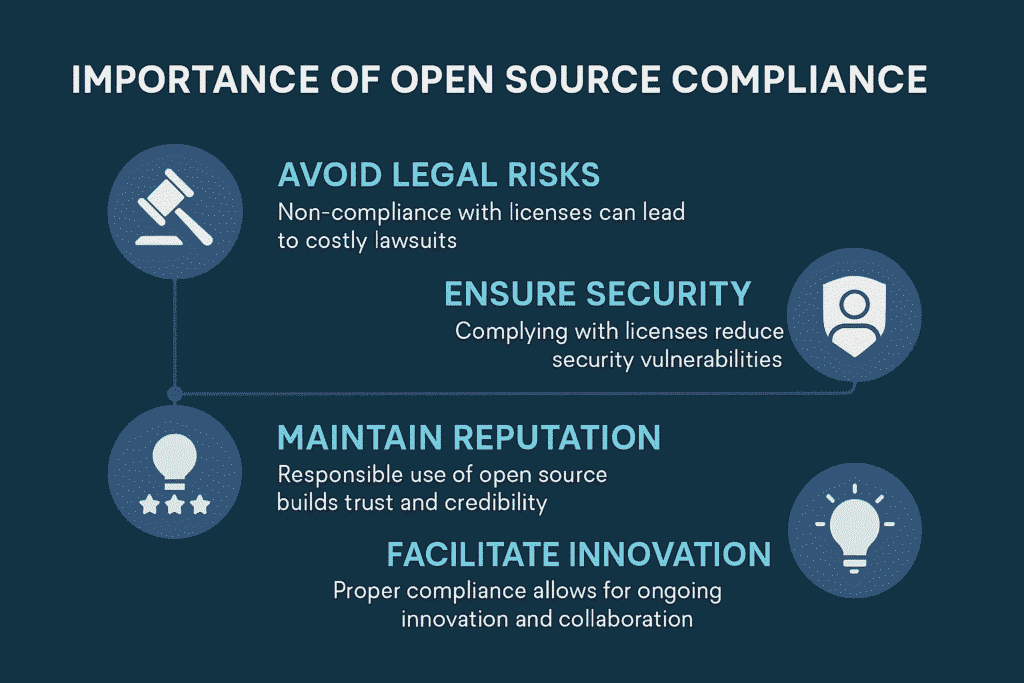Startups across Dubai and Sheridan are scaling fast, and many are doing so with open source software (OSS) at their core. But while OSS offers flexibility and speed, open source compliance for startups is critical to avoid legal, operational, and reputational risks. Whether you are building a fintech app or launching a SaaS platform, ignoring compliance early can lead to setbacks later.
At Yahyou, we work with early-stage companies across different regions to help them build lean, scalable compliance systems that do not slow innovation. In this article, we explore why startups in Dubai and Sheridan need to take open source compliance seriously — and how they can stay ahead of future audits, funding rounds, or acquisition reviews.
Why Startups in Dubai and Sheridan Are Embracing OSS
Open source software is the backbone of modern development. For startups, the appeal is clear: it is free, community-driven, highly flexible, and integrates easily with other tools. Whether you are using libraries, frameworks, or full-stack components, OSS offers the speed and agility that early-stage teams need.
In Dubai, government-backed innovation zones and tech incubators are encouraging rapid product development in sectors like fintech, logistics, and healthtech. Similarly, Sheridan has become a quiet hub for US-based remote startups, many of which operate lean and rely heavily on open source to build MVPs and launch digital services.
But with every package installed, the startup inherits not only code, but also licensing obligations. And that is where many companies fall short.
The Compliance Risks Startups Overlook

Most startup teams are not thinking about legal risks when they install a library from GitHub. But the wrong license or a missing attribution file can become a problem when investors step in, or when your product scales and enters commercial agreements.
Here are some common compliance risks startups face:
- Using GPL or AGPL licensed components that conflict with proprietary business models
- Failing to track transitive dependencies that bring in incompatible licenses
- Missing or outdated Software Bills of Materials (SBOMs)
- Distributing software without fulfilling attribution or disclosure requirements
- Delayed funding or acquisition deals due to unresolved legal exposure
These issues are especially common in high-growth teams that prioritize speed over process.
Learn more about common pitfalls in our guide:
7 Common Mistakes in Open Source Compliance
Why Local Regulations and Global Standards Matter
Dubai is rapidly becoming a center for technology investment. Startups operating under hubs like the DIFC Innovation Hub or those funded by local VCs are often subject to due diligence that includes software licensing reviews. In this landscape, open source compliance for startups is not just a best practice but a critical requirement. Investors want to ensure that your codebase is free from legal risks, especially if you are using open source in financial applications or critical infrastructure.
Sheridan, while smaller, is closely tied to the US tech ecosystem. Whether you are applying to a US accelerator, preparing for an acquisition, or entering commercial partnerships, open source compliance for startups remains a key factor. Many of these reviews require documentation of your OSS usage, risk controls, and audit readiness.
To learn more about startup policy alignment in Dubai, visit the DIFC Innovation Hub
How a Startup-Friendly OSS Compliance Strategy Looks
Compliance does not have to be heavy or expensive. The key is to implement a lightweight, scalable framework that grows with your team. Here is what that might look like:
- Generating a basic SBOM that lists every open source component used
- Using simple license scanners to detect high-risk packages
- Keeping documentation for attributions and disclosures
- Setting an internal policy for developers on what OSS can and cannot be used
- Preparing early for the possibility of a compliance audit
Yahyou offers tailored audits for startups, including early-stage reviews that help you prepare without disrupting your development flow. Learn what goes into a typical audit here: What to Expect During an Open Source Compliance Audit
Yahyou’s Compliance Support for Startups
We understand that startups have unique needs. You need fast solutions that do not get in the way of product development. Our team provides startup-focused compliance support that includes:
- Automated SBOM generation with minimal setup
- License detection tools built for small teams
- Clear documentation workflows for investor due diligence
- Scalable policies that adapt as your team and codebase grow
- Risk assessments that prioritize your roadmap and product goals
We work with teams in both regulated and unregulated markets to help them stay audit-ready without overbuilding.
Explore our services:
Open Source Compliance Management
Secure Growth Starts With Smart Compliance
Open source can give startups a competitive edge, but only when used responsibly. A few risky packages, missing files, or conflicting licenses can derail funding or slow your product launch. Open source compliance for startups ensures that rapid growth does not come at the cost of legal or technical debt. Startups in Dubai and Sheridan are moving fast, but speed without compliance can lead to setbacks.
Early action is the best defense. Build compliance into your workflow now, while your codebase is still manageable. When investors, customers, or partners ask about your software risk, you will be ready with clear answers and documentation.
If your team needs help implementing open source compliance for startups, auditing your current OSS stack, or preparing for due diligence, our experts are here to support you.

